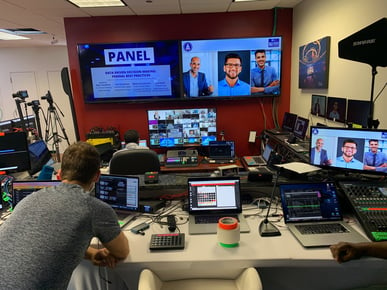Event Budget Optimization: How to Maximize Impact and Reduce Costs
Planning a high-impact event while staying within budget is no easy feat. As a marketing executive, executive assistant, or chief of staff, you’re tasked with ensuring every dollar spent delivers maximum value. In this guide, we’ll share smart budgeting strategies to help you optimize costs, negotiate better vendor deals, and create exceptional event experiences—without compromising quality. Whether it’s a leadership retreat, board meeting, or company-wide conference, these tips will help you make the most of your event budget. Read on to plan smarter and spend wiser!
EVENT BUDGET
Sandy Yi-Davis
3 min read


As an busy marketing executives, executive assistant or chief of staff, orchestrating successful meetings and events while managing budgets is a critical responsibility. Whether you're planning a leadership retreat, board meeting, or company-wide conference, knowing how to optimize your event budget can be the difference between a good event and an exceptional one.
In this guide, we’ll explore strategic tips to help you maximize your budget while delivering memorable experiences for attendees.


Start with Your Audio-Visual Strategy
Surprisingly, one of the biggest budget drivers isn’t the venue or catering—it’s your audio-visual (AV) requirements. AV can consume up to 25% of your total budget and directly impact your space requirements. Even basic AV setups take up valuable real estate and can add significant costs.
Pro tip: Include detailed AV specifications in your initial RFPs to venues and hotels. This helps secure accurate pricing and avoids unexpected costs during contract negotiations.


When overnight stays are needed, understanding the "room-to-space ratio" is key. Hotels prioritize revenue from guest rooms, treating meeting space and food and beverage (F&B) as complementary. Use these tips to get the best value:
For smaller groups (under 50 rooms), target boutique hotels with 100–150 total rooms for more personalized attention.
For larger events, consider separating your venue and accommodations to maximize savings.
Indicate flexibility in your RFPs—venues may offer better rates if you can fill gaps in their calendar.
Plan Accommodations Strategically
Time Your Event
Strategic timing can significantly reduce costs. Be mindful of factors like:


Regional patterns: Rates in cities like Washington D.C. may skyrocket during congressional sessions.
Major events: Avoid dates that coincide with conventions, sporting events, or festivals in your chosen destination.
Seasonal demand: Shoulder seasons often offer lower prices without sacrificing quality.
Optimize Food & Beverage Costs
Food and beverage (F&B) can be one of the most expensive components of your event. Understanding how pricing works—and where to cut unnecessary costs—can help you stay within budget.
F&B Tips:
Review banquet menus to ensure pricing aligns with your meal goals.
Focus on protein selection, which is typically the most expensive item.
Streamline buffet options by offering two choices per category instead of three.
Plan desserts by the dozen instead of per person.
Always account for dietary requirements while balancing cost efficiency.
Don’t Overlook the Full Budget Picture






While AV, accommodations, venue, and F&B are core elements, many other costs can sneak up on you. Be sure to budget for:
Staff and labor costs
Speaker fees and content development
Marketing and registration systems
Post-event follow-up materials
Attendee takeaways
By keeping these additional items in mind, you can avoid surprises and keep your event on track financially.
Focus on Creating Memorable Experiences




Budget optimization isn’t just about cutting costs—it’s about making every dollar count. Attendees may not remember how much you spent, but they will remember how the event made them feel. Prioritize creating engaging experiences and meaningful connections within your budget constraints.
Work with Professional Partners
Collaborating with experienced event planners can help you save both time and money. Their industry knowledge and established relationships can unlock significant savings through:
Strategic venue selection
Vendor negotiations
Menu optimization
Efficient space utilization
Conclusion: Take a Strategic Approach to Event Budgeting
The key to successful event budget management is understanding how each component interacts and contributes to your overall strategy. With a thoughtful, strategic approach, you can create high-impact events that achieve your goals without exceeding your budget.
